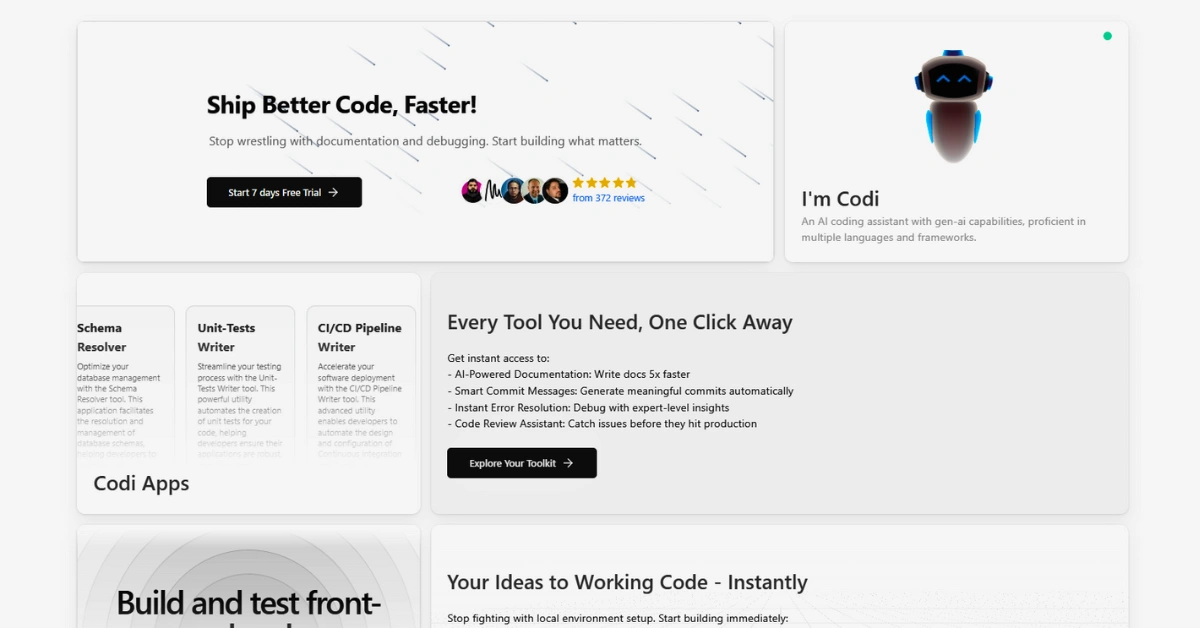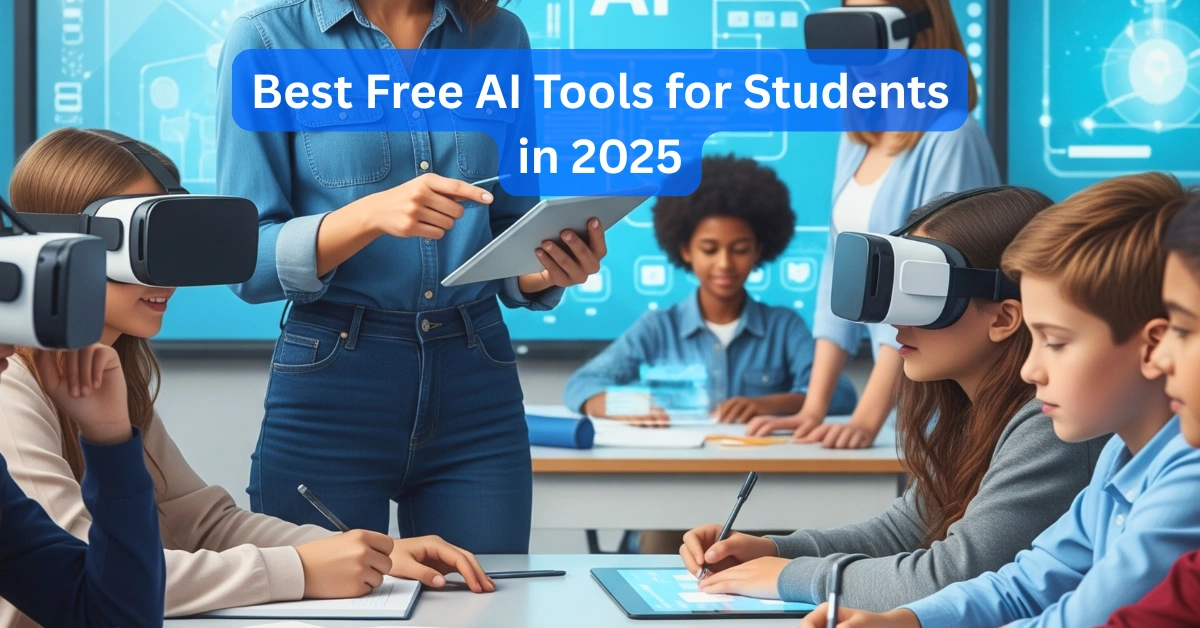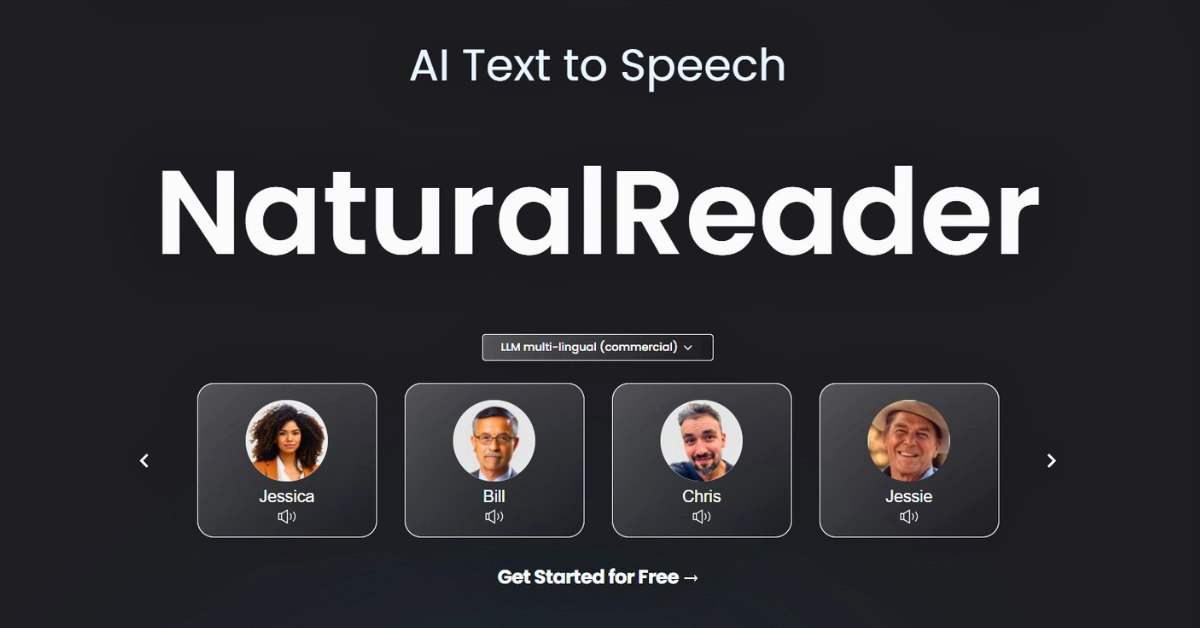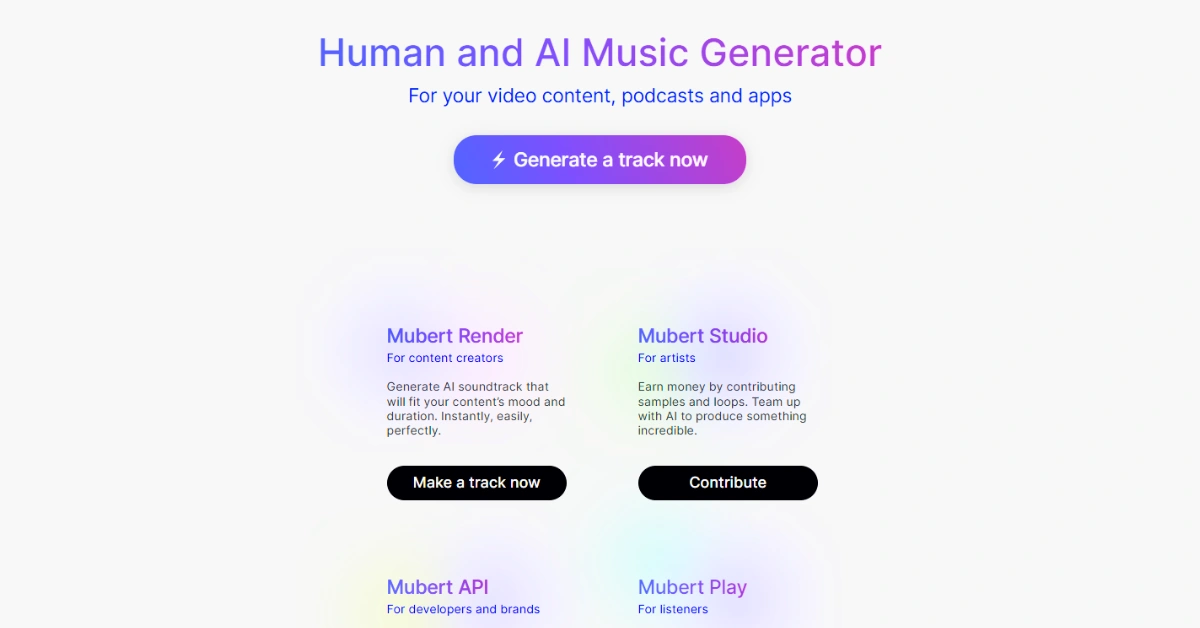The Future of AI in Marketing: How to Utilize AI for Success
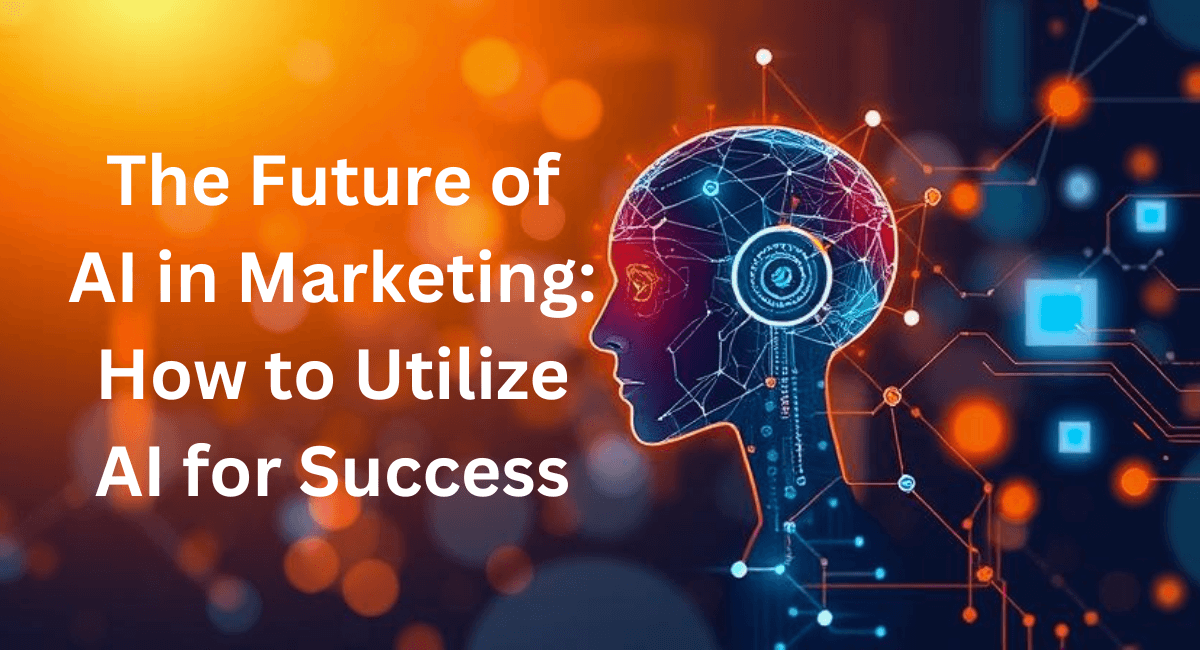
Artificial intelligence is not just a term anymore, it is a groundbreaking reality that is reshaping the digital landscape. Interestingly, this is significantly true in the realm of digital marketing, allowing businesses to refine strategies, personalize customer experience, and automate repetitive tasks.
According to Forbes, by 2030, the AI market is projected to boost $1.5 trillion in value globally. This means generative AI and machine learning will give rise to AI-driven content generation, predictive analytics, and hyper-personalized campaigns, making businesses thrive and boost ROI.
In this guide, we will explore the role of AI in marketing, its key benefits, and how businesses can seamlessly integrate AI strategies to drive growth and generate income. However, as AI continues to evolve, marketers and entrepreneurs need to utilize accurate tools to stand in the competitive digital market.
What is AI Marketing?
AI marketing is known as the use of artificial intelligence, machine learning, and automation tools to improve and optimize marketing approaches. Simply put, it allows businesses to interpret large amounts of data, predict customer behavior, and offer personalized experiences.
Additionally, AI-assisted marketing solutions assist brands in automating content creation, segmenting audiences, and campaign management, making digital marketing more efficient and data-driven.
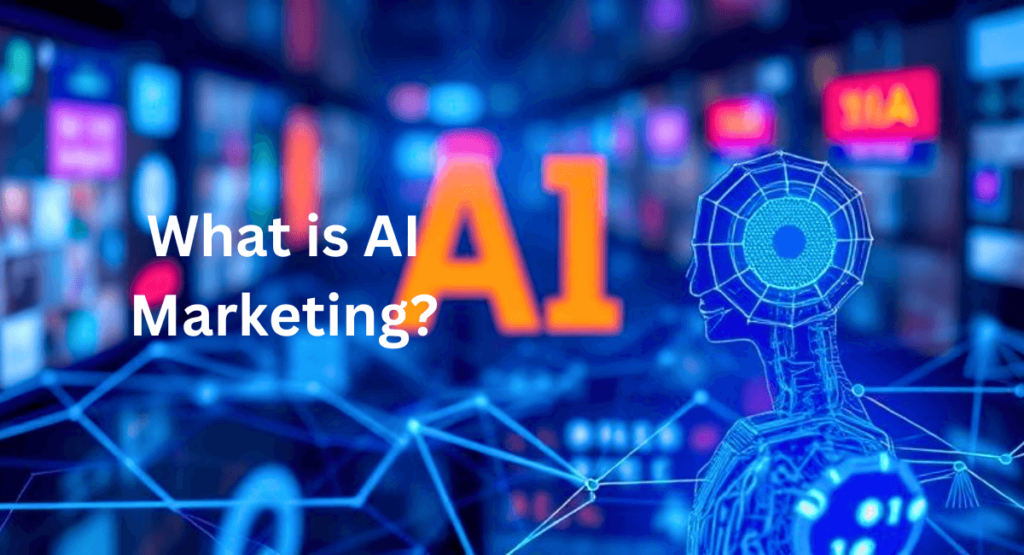
The Role of Automation and Data-Driven Decision Making
Automation driven by AI mitigates repetitive tasks like scheduling social media posts, email marketing, and ad placements, allowing marketers to focus on more strategic and creative tasks.
On the other hand, data-driven decision-making allows brands to use real-time analyses, enhance customer targeting, and customize campaigns based on performance metrics.
Moreover, AI-assisted insights also aid marketers in adapting to the current trends and providing what customers are demanding. Overall, this ensures a more dynamic and efficient marketing approach.
Benefits of AI in Marketing
AI-powered solutions and tools are benefiting digital marketing in several ways. From automation, and personalization to enhanced customer services, and content creation, AI is everywhere. Let’s explore some of the major advantages AI brings to the marketing landscape.
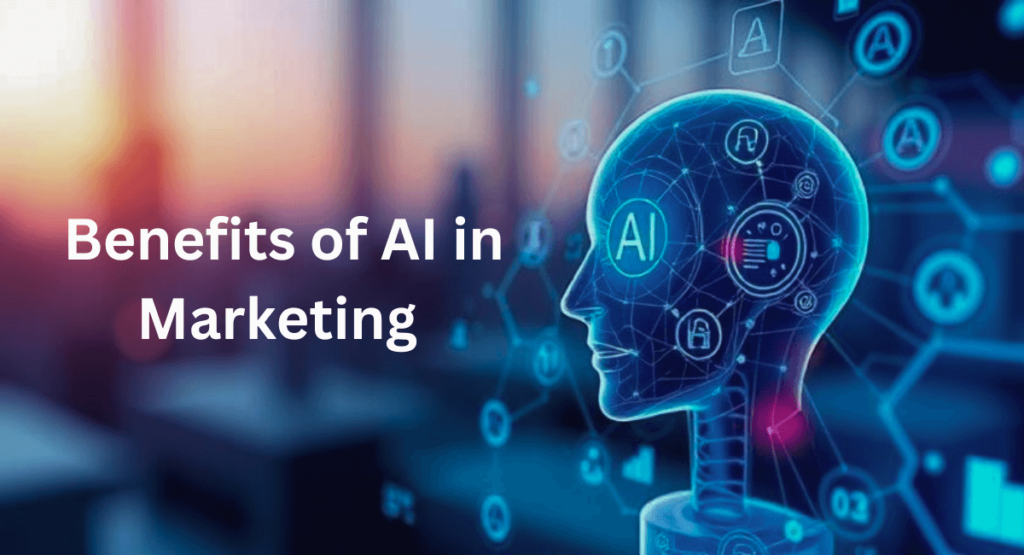
It Helps in Faster, Smarter Decision-Making
AI helps you analyze and process large amounts of data quickly, giving marketers actionable insights in real-time. Moreover, this will enable brands and businesses to make informed decisions, optimize strategies, and adapt to market trends instantly.
It Improves Customer Targeting and Personalization
AI brings more personalization by analyzing customer preferences, buying history, and online behavior. From this, marketers can create hyper-personalized campaigns, recommend products, and offer specified content that resonates strongly with customer needs, overall increasing engagement and conversions.
It Brings Enhanced Marketing and ROI
AI automates time-consuming tasks, optimizes ad spending, and improves campaign performance through predictive analytics. This helps marketers to manage resource allocation, decrease costs, and high returns on marketing investments.
Moreover, AI also aids businesses and marketing professionals in measuring KPIs effectively, ensuring data-driven approaches that generate profitability.
Common AI Technologies Powering Modern Marketing
Here are some key technologies that are backing AI-powered marketing. Let’s explore some common and their roles.
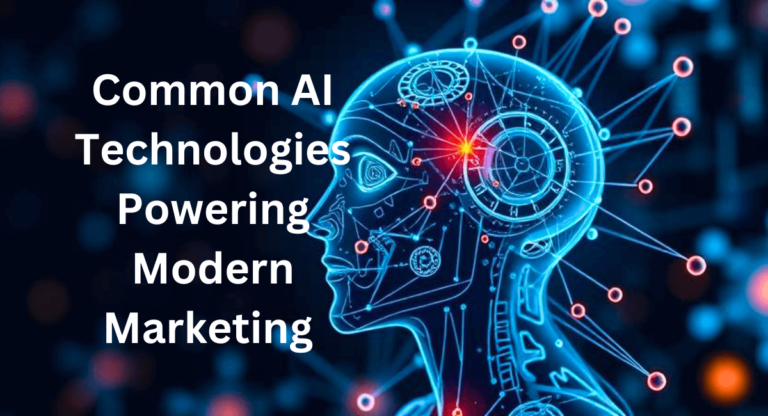
Machine Learning (ML) in Marketing
Machine learning is aiding marketing by analyzing large datasets, interpreting patterns, and making data-driven predictions. Additionally, ML-powered algorithms optimize advertising strategies, improve customer segmentation, and personalize content.
Marketing professionals use ML to automate repetitive tasks, such as email marketing, product suggestions, and dynamic pricing, giving a more efficient and centric approach to marketing.
Natural Language Processing (NLP) for Marketing
Natural Language Processing (NLP) allows you to understand, analyze, and generate human languages. It plays a significant role in marketing through AI-powered chatbots, automated customer services, and interpreting sentiments from social media and reviews.
Moreover, NLP also improves SEO by enhancing content optimization, voice search capabilities, and key relevance, allowing brands to rank higher on search engines.
Predictive Analytics & AI-Driven Insights
The most cutting-edge technology for marketing is predictive analytics which uses AI to predict future outcomes, customer behavior, and market shifts by running data analysis. For instance, by analyzing historical data, AI can tell which marketing efforts will drive the highest engagement and ROI. Meanwhile, businesses can also use predictive analytics for demand forecasting, churn prediction, and personalized marketing campaigns.
AI in Marketing: Key Applications and Use Cases
Now let’s talk about how you can use the maximum potential of AI in different marketing areas to increase efficiency and drive growth. Here are some key applications and use cases of AI in marketing:
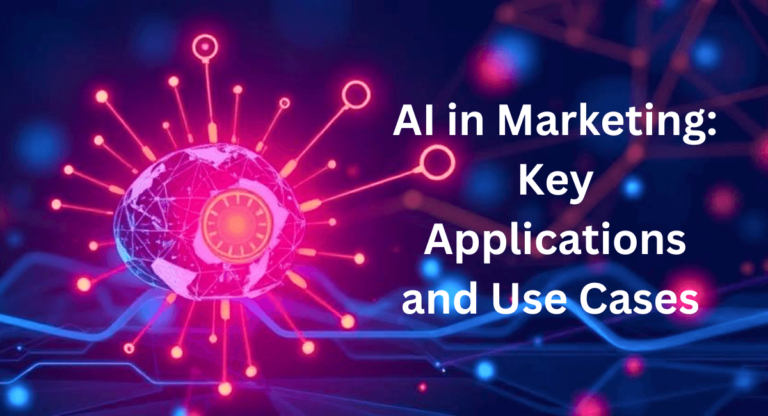
AI in Content Marketing
AI is changing the way people do content marketing. By automating content generation, optimizing SEO, and improving engagement strategies, AI is revolutionizing content marketing.
Several AI tools are available that help you in generating blog posts, articles, and even video content, while AI-assisted keyword research tools assist you improve your search ranking and visibility.
Top AI Tools You Can Use for Content Marketing
Tool | Key Features | Best For | Pricing |
Jasper AI | AI-powered content creation | Bloggers, Marketers, Businesses | Free trial and paid plans start at $39/ month |
Surfer SEO | AI-driven content optimization | SEO professionals, Content writers | Starts at $89/month |
Copy AI | Automated Copywriting | Ad copy, emails, social media | Free plan available, Paid from $36/month |
AI in Customer Engagement & Support
The other most widely used cases of AI in marketing are in customer engagement and support. AI chatbots and virtual assistants offer real-time customer interactions and available 24/7, overall enhancing response times and customer satisfaction. Moreover, sentiment analysis helps gather public demand, perception, and reasoning actively.
AI Tools You Can Use for Customer Engagement & Support
Tool | Key Features | Best For | Pricing |
ChatGPT | Conversational AI, content assistant | Customer service, content creation | Free, Paid from $20/month |
Drift | AI-backed customer engagement | Sales and Marketing teams | Custom Pricing |
HubSpot Chatbot | AI-powered customer support | Businesses and Enterprises | Free & Paid plans, starting from $45/month |
AI in Programmatic Advertising and Digital Media
AI is really helpful in advertising and programmatic media buying. Using AI to analyze data and automation, you can streamline ad targeting, media buying, and campaign optimization. Moreover, enterprises can use AI for presented ad performance tracking and budget allocation.
Top AI Tools You Can Use In Advertising
Tool | Key Features | Best For | Pricing |
Google Ads AI | Automated ad placements & bidding | Digital Marketers, Business | Custom Pricing |
Meta Advantage+ | AI-assisted ad campaign management | Facebook & Instagram ads | Custom Pricing |
Adzooma | Ad performance optimization | Google, Facebook, Microsoft Ads | Free + paid plan from $99/month |
AI in Personalization & Customer Journey Mapping
Have you ever thought about how you get direct name emails from brands? This is all because of AI and personalization. AI improves customer experiences through hyper-personalization, predictive lead scoring, and behavioral targeting.
Moreover, by knowing what customers want through customer journey mapping, AI allows brands to create tailored marketing strategies and improve engagement.
AI Tools You Can Use in Personalization
Tool | Key Features | Best For | Pricing |
Dynamic Yield | AI-enhanced personalization | E-commerce & Retail | Custom Pricing |
Optimizely | AI-backed A/B testing & CRO | Marketers, Product Teams | Custom Pricing |
Segment | AI-based customer data platform | Businesses managing customer data | Free + Paid plans, start from $120/month |
AI in E-Commerce & Retail Marketing
In e-commerce and retail marketing, AI helps you in product recommendation by analyzing customer purchase history and buying behavior. Moreover, it also assists businesses in dynamic pricing, inventory forecasting, and refining e-commerce strategies. All these strategies and approaches ensure better conversion rates and customer retention.
Top AI Tools for E-Commerce
Tool | Key Features | Best For | Pricing |
Shopify AI | AI-driven e-commerce automation | Online store owners | Custom pricing |
Clerk.io | AI-assisted product recommendations | E-commerce businesses | Custom pricing |
Recombee | AI-based personalization engine | Retail & E-commerce | Custom pricing |
AI in Social Media Marketing
Social media marketing is a powerful segment where AI can benefit predominantly. AI marketing tools aid marketers with social media listening, audience sentiment analysis, automated content scheduling, and performance analytics to enhance engagement and reach.
Top AI Tools for Social Media Marketing
Tool | Key Features | Best For | Pricing |
Sprout Social | AI-powered social media analytics | Social Media Managers | Starts at $24/month |
Lately AI | AI-generated and optimized social media content | Marketers, Brands | Custom Pricing |
Hootsuite | AI-backed social media management | Content Scheduling, Analytics | Start at $99/month |
Real-World Examples: Companies Using AI for Marketing
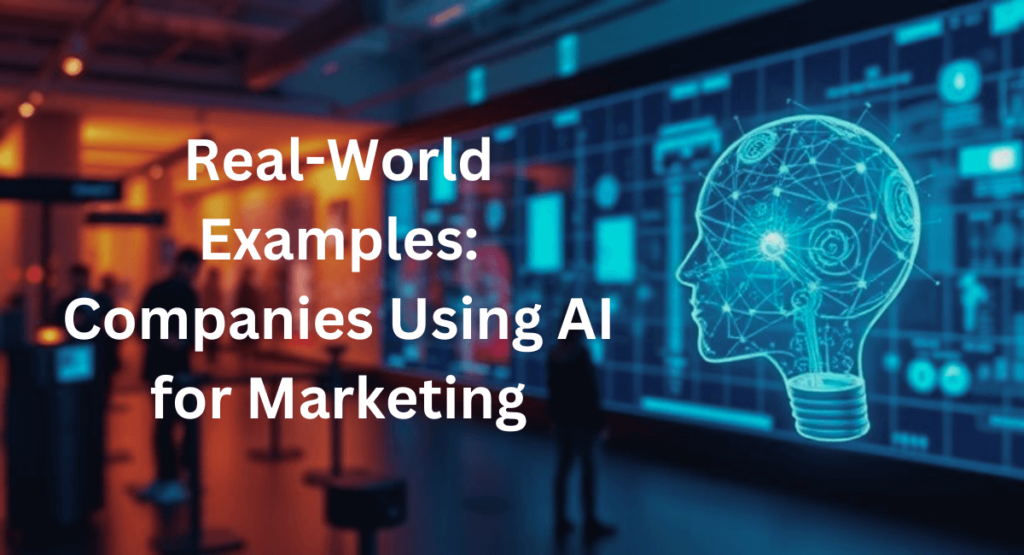
Here are some top companies that are using AI in marketing:
Company | AI Application | How It Works |
Amazon | AI-powered product recommendation | Use machine learning to check browsing history and purchasing behavior |
Netflix | AI-assisted content personalization | Suggests TV shows and movies based on user preferences and watching history |
Coca-Cola | AI in social media and customer insights | Utilize the power of AI-powered sentiment analysis to track brand mentions and customer emotions |
Sephora | AI Chatbots and Virtual Try-on | AI-based chatbots give personalized beauty advice and AR lets users apply makeup virtually |
How to Implement AI in Your Marketing Strategy: A Step-by-Step Guide
Till now, you are informed how artificial intelligence is transforming the marketing landscape. However, successfully implementing AI requires strategic planning and execution. Here is a step-by-step guide to implementing AI effectively.
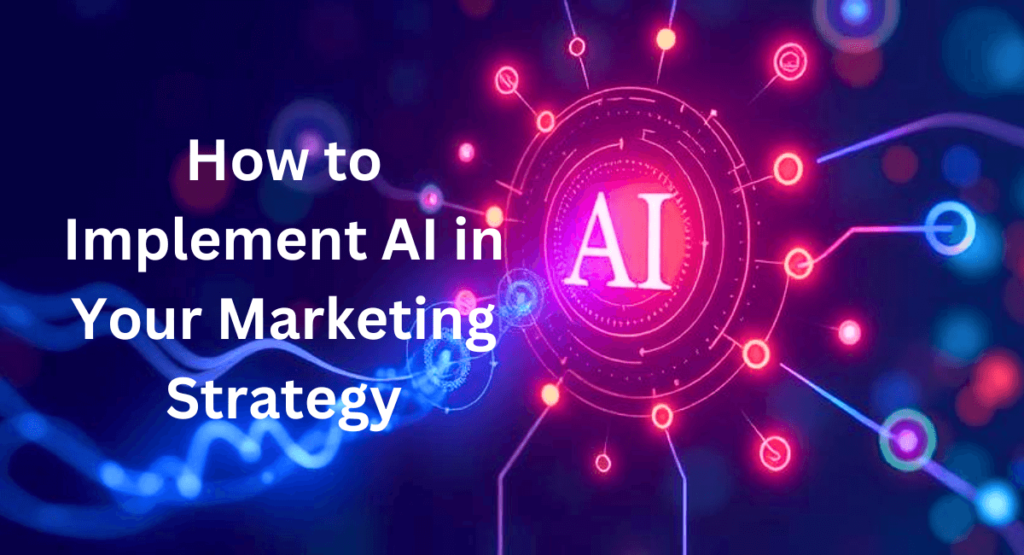
1. Define your Marketing Goals
- First, you need to determine the key areas where AI can actually add value, such as automating customer support, improving content creation, or optimizing ad campaigns.
- Set clear, definable objectives like increasing conversion rates, improving customer engagement, or boosting ROI.
2. Choose the Right AI Tools
- Take time to analyze your needs and then choose AI-powered solutions that align with your business needs and goals.
- Make sure to consider factors such as cost, ease of use, integration capabilities, and scalability.
3. Integrate AI with Existing Marketing Systems
- Ensure seamless compatibility with your Customer Relationship Management (CRM) system, Content Management System (CMS), and analytics platforms.
- Additionally, use API integrations to connect AI tools with your existing workflows.
4. Train AI Models Using High-Quality Data
- AI models depend on data to make decisions. Offer high-quality, structured data for better outcomes.
- Frequently update datasets to ensure that AI changes with market trends and customer behavior.
5. Regularly Monitor AI Performance and Optimize
- AI tools need continuous monitoring to increase efficiency and remove biases and errors.
- Refine AI algorithms based on data insights, ensuring they remain effective and current.
Challenges & Considerations in AI Marketing
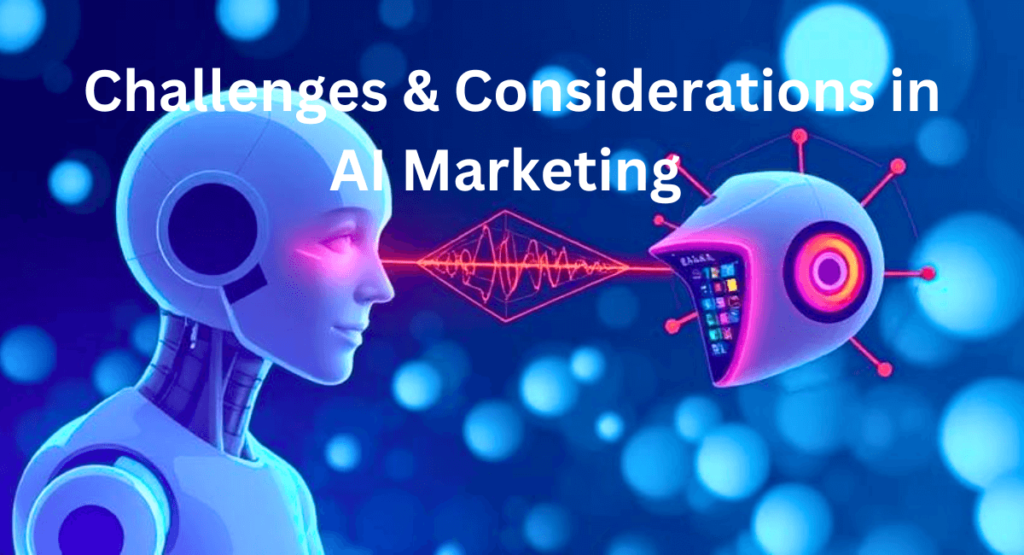
While AI offers numerous benefits, it also poses many challenges that business owners must address to ensure ethical, cost-effective, and efficient implementations.
Ethical and Privacy Concerns
- Data Privacy Compliance: For effective and ethical functioning, you must adhere to regulations like the General Data Protection Regulation (GDPR) and the California Consumer Privacy Act (CCPA) to ensure customer data.
- AI Bias and Ethical Marketing: Integrate bias elimination techniques to ensure inclusive and fair AI applications.
Cost and ROI Concerns
- Measuring AI’s Impact: Marketing leaders should analyze key performance indicators (KPIs) like engagement rates, customer lifetime value (CLV), and cost per acquisition (CPA) to assess AI’s impact.
- Balancing AI Costs: AI tools often require significant investment. Look for cost-effective tools and invest strategically while optimizing marketing spend.
Future Trends in AI Marketing
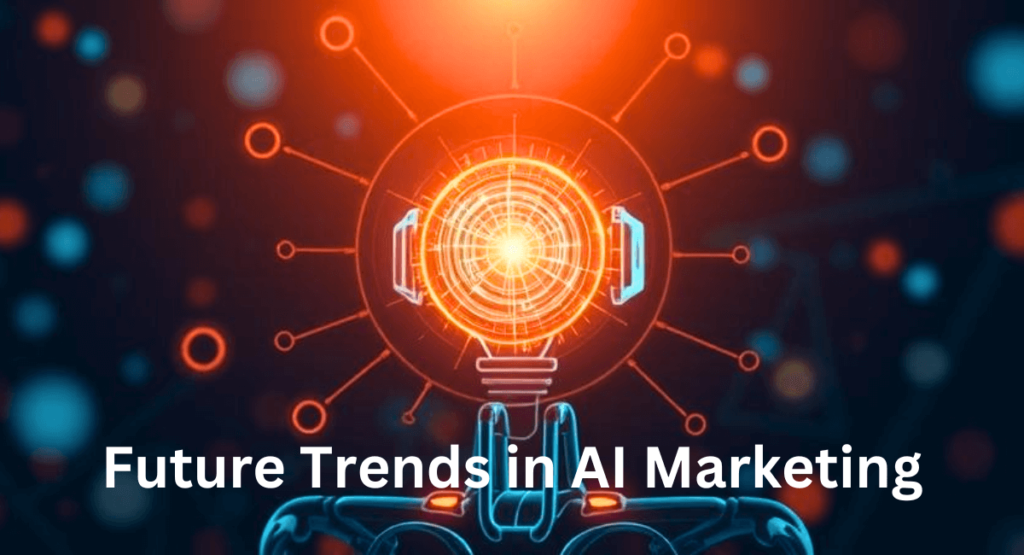
As AI continues to evolve, new technologies and innovation will level up marketing strategies. Here are some key trends we can anticipate for the future.
Emerging AI Technologies in Marketing
In the coming years, AI will be more intelligent in offering personalized experiences. Generative AI will boost the content creation game. Moreover, deep learning algorithms will analyze user behavior in real time more efficiently to give tailored recommendations.
Interestingly, you will see the trend of Augmented reality (AR) and Virtual reality (VR) marketing that enable businesses to offer immersive brand experiences.
Predictive & Prescriptive AI for Marketing Innovation
AI will anticipate future consumer trends, enabling businesses to refine and adapt their strategies actively. Enterprise will use predictive analytics for demand forecasting, optimizing inventory, and developing targeted promotions.
Additionally, AI-driven tools reshape marketing approaches, enabling marketers to maximize marketing success by offering personalized campaign strategies, ad placement, and resource allocation.
Conclusion
In conclusion, AI is changing digital marketing with modern tools and innovations. It opens smarter ways for businesses to engage with customers, optimize campaigns, and drive growth. By successfully implementing AI, businesses can improve efficiency, enhance customer experiences, and gain desired marketing outcomes.
However, companies and business owners must address ethical concerns and challenges, monitor AI continuously, and ensure data privacy issues for effective and fair AI regulation. In a nutshell, AI will advance further, and to stay ahead of the curve, it is important to upskill and get informed about new trends.
Frequently Asked Questions
How is AI used in marketing?
- AI is used in marketing in several areas, such as for customer personalization, content creation, AI chatbots, and predictive analytics.
What is the future of marketing with AI?
- The future of AI in marketing is bright like other industries. You will see a rise in hyper-personalization, AR and VR marketing, and more.
Is marketing being replaced by AI?
- Not at all. It is a myth. AI is improving marketing efficiency, for sure, but not replacing human marketers.



